Saving meadows ?
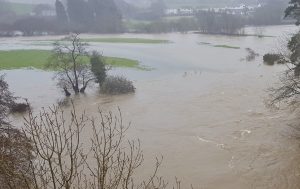
It is depressing to pick up a paper or turn on the news to be met with a catalogue of distressing and difficult stories. There is also the overarching problem of global warning and climate change. Only recently, there have been reports of flooding in Sydney after torrential rain, fires are springing up again in Colorado and other States, and India experienced a heat wave (combined with a drought), with some cities experiencing temperatures of 40o+C. This has resulted in the deaths of individuals, and as the heat wave occurred in the final weeks of the wheat growing season it has killed many crops before harvest. In Balochistan, the peach and apple harvest has been severely impacted.
Here in the UK, there are a number of problems, indeed we have been described as “one of the most nature-depleted countries in the world”. We have lost plant and animal species, such losses could lead us into an ‘ecological recession’. This occurs when ecosystems systems lack the diversity needed to function well.
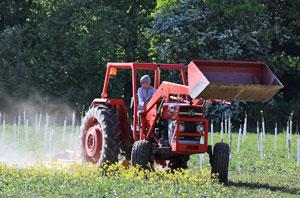 Much of the damage to (or loss of) our ecosystems is associated with the industrial revolution followed by the intensification of mechanised farming. The 1950’s and 1960’s witnessed the loss of vast tracts of hedges and the removal of small copses to increase the area for farming / food production, and allow the use of heavy duty mechanised machinery. There was also the extension of road networks - motorways etc. and urban sprawl /development. Though woodlands and forests were being eroded long before the industrial revolution; woodland, forest and pasture covered much more of the land than now. There were areas of ‘wilderness’ that were home to animals and plants that have long since gone or are now very rare - ranging from wolves, bears, to beavers and red squirrels.
Much of the damage to (or loss of) our ecosystems is associated with the industrial revolution followed by the intensification of mechanised farming. The 1950’s and 1960’s witnessed the loss of vast tracts of hedges and the removal of small copses to increase the area for farming / food production, and allow the use of heavy duty mechanised machinery. There was also the extension of road networks - motorways etc. and urban sprawl /development. Though woodlands and forests were being eroded long before the industrial revolution; woodland, forest and pasture covered much more of the land than now. There were areas of ‘wilderness’ that were home to animals and plants that have long since gone or are now very rare - ranging from wolves, bears, to beavers and red squirrels.
Whilst woodlands were and are havens for many plant and animal species, meadows and pastures have suffered too. The PlantLife charity has suggested that the UK has lost some 97% of its wildflower meadows during the course of the last century and what remains could be under threat. Lowland meadows are rich sources of biodiversity, both plant and animal, they also store carbon in the soil and ‘knit’ the soil together, so that it is not subject to erosion.
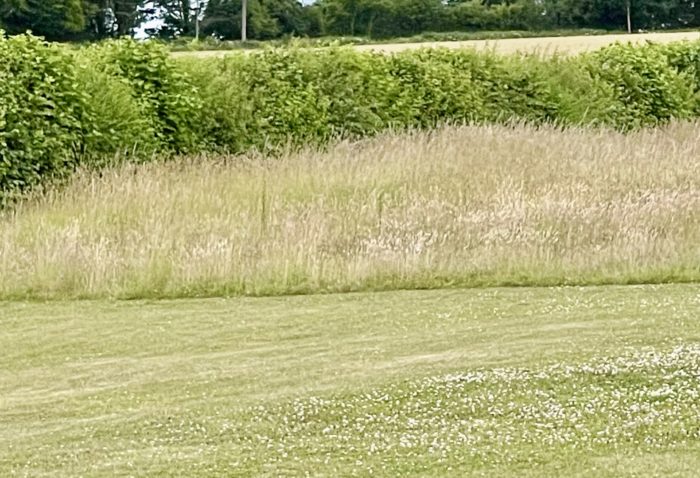
A meadow, partly mown and partly 'wild'.
Many species are dependent on these habitats, but with the expansion of agriculture and construction of motorways - the landscape has become 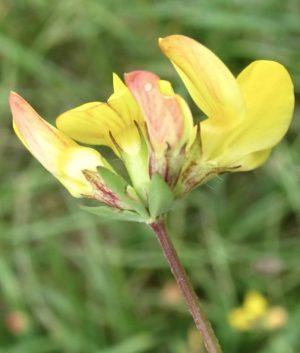 fragmented and many species cannot across the formidable barriers. The Scottish primrose is now only to be found on the north coast of Scotland and Orkney, and some orchids are described ‘as just hanging on’. Species like the common blue butterfly is reliant of bird’s foot trefoil, Greater Bird’s-foot-trefoil, Black Medick and white clover for food for its caterpillars. The great yellow bumblebee is sadly now one of the rarest British bumblebees. It is limited to flower-rich areas in the Orkneys, Caithness and Sutherland. It is particularly associated with red clover. It is a large species, and was once widespread across the U.K.
fragmented and many species cannot across the formidable barriers. The Scottish primrose is now only to be found on the north coast of Scotland and Orkney, and some orchids are described ‘as just hanging on’. Species like the common blue butterfly is reliant of bird’s foot trefoil, Greater Bird’s-foot-trefoil, Black Medick and white clover for food for its caterpillars. The great yellow bumblebee is sadly now one of the rarest British bumblebees. It is limited to flower-rich areas in the Orkneys, Caithness and Sutherland. It is particularly associated with red clover. It is a large species, and was once widespread across the U.K.
Creating space and opportunities for wild flowers has been PlantLife's foremost objective from “No mow May”, “Save nature on our roadside” (see the woodland blog here and here) ’Fight for sites” all of which aim to increase the number of sites for wild flowers and their pollinators to flourish. The Scottish Government has been helping establish wildflower meadows at some of its national nature reserves - notably St Cyrus, Flanders Moss and Forvie, and they are working with PlantLife to create an action plan for Scotland’s grassland. It is keen for farmers to be involved, offering areas of wild flowers on their farms. By increasing the areas in which wild flowers (and their associated insects) can flourish, the connectivity can be restored (at least in part). The creation of biological corridors allows plants and animals to move, which is particularly important in these times of climate change.
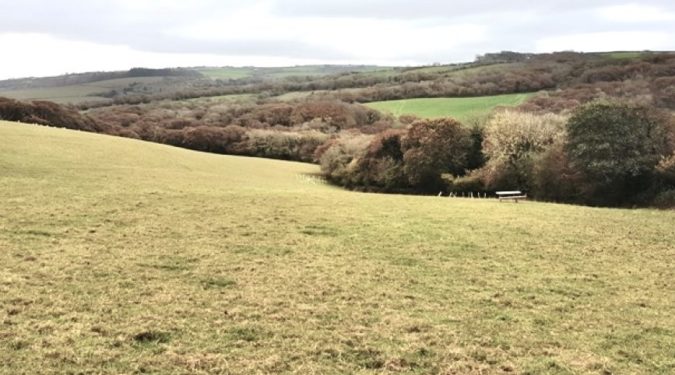
Comments are closed for this post.
Discussion
Your “nature depleted” link is an Apple advert, have you been hacked?
Act now before it is too late.

Thank you.
Blogs
28 October, 2022